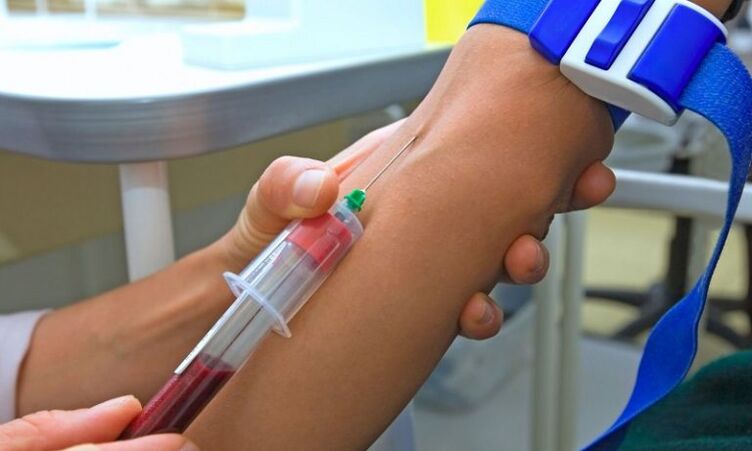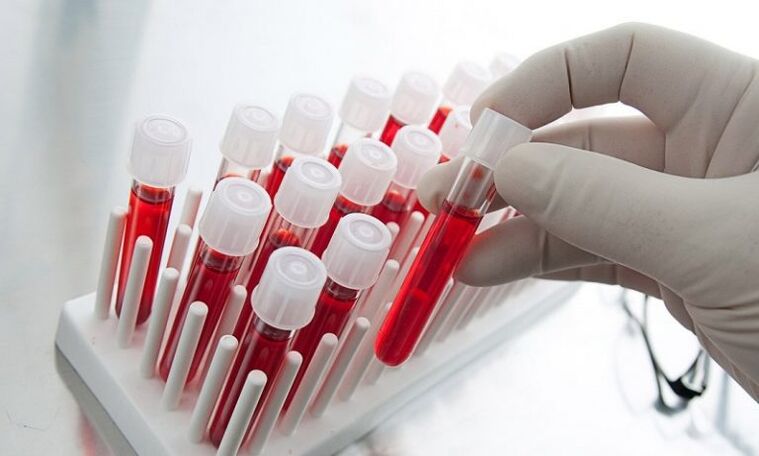Currently diagnosing prostate inflammation is a very simple procedure for doctors. Except for rare atypical diseases, the diagnosis of acute prostatitis is relatively easy.

During the treatment of the disease, patients need to undergo a series of laboratory and instrumental checks. Patients are usually interested in why they need a general PSA blood test for prostatitis. Not everyone understands the role of this marker in diagnosing underlying diseases.
What is PSA?
Prostate-specific antigen (PSA) is a special glycoprotein produced only by prostate cells. Its main function is to liquefy sperm and activate sperm during ejaculation.
This protein can be found in the blood because it is only produced in the prostate, so it partially demonstrates its functions and various pathologies.
It is widely used in the diagnosis of diseases, such as:
- Chronic prostatitis;
- Benign prostatic hyperplasia-prostate adenoma;
- Malignant tumors of male organs-prostate cancer.
The general PSA blood test for chronic prostatitis can show the progression of the disease and the dangerous complications of the disease, which is manifested by the degeneration of damaged cells into atypical cells and the formation of prostate cancer.
Prostate-specific antigen is a tumor marker that can indicate the presence of tumors in the early stages of its development.
Normal index
Since protein is synthesized in male glands, it is normal for a small amount of protein in the blood. The screening threshold for the normal activity of tumor markers is as high as 4 ng/ml in the blood.

The amount of protein directly depends on the following factors:
- The age of the man. There is a certain correlation between the age of the patient and the activity of the gland to produce markers;
| Age, years | PSA index, ng/ml |
| 40-49 | 2. 5 |
| 50-59 | 3. 5 |
| 60-69 | 4. 5 |
| >70 | 6. 5 |
- The regularity of sexual intercourse;
- The presence of the inflammatory process of the prostate;
- Physical trauma and organ damage;
- Postpone surgical intervention or specific diagnostic procedures (prostate massage, digital rectal examination);
- take medicine.
All of these aspects affect the antigen count in the blood and sometimes even confuse the doctor. This is why it is necessary to know how to correctly pass the PSA blood test for general male prostatitis in order to further successfully treat it.
PSA preparation
Before donating blood for the detection of prostate-specific antigen, he must observe some important points to prevent misunderstanding of the final result.

To avoid laboratory errors, patients should consider the following characteristics:
- Do not eat 8 hours before blood sampling. You can drink tea, juice or water.
- Avoid cycling, stationary bicycles, or long-distance hikes 24 hours before the start of the study (>5 km).
- One week before the examination, sexual intercourse and masturbation should be avoided, and spicy and smoky food should be avoided.
- If the patient has undergone a transrectal prostate ultrasound (TRUS), digital rectal exam, colonoscopy, or bladder catheterization, they will need to wait at least 7 days to determine the PSA in the blood.
- After prostate biopsy or prostate massage, you need to wait 2 weeks.
Only by following all these rules can it be possible to say that the PSA blood test for general prostatitis is truly reliable.
Decoding and goals of PSA testing
The main purpose of this examination is to be able to control the progression of the chronic form of the disease and quickly identify the problem when prostate malignancy (tumor formation) occurs.
In acute, chronic, bacterial, congestive prostatitis and other diseases, the PSA level may rise slightly to 5 ng/ml. This is not the cause of the panic. If the index does not return to normal after adequate medical treatment, then this is considered an absolute indication for organ puncture and subsequent histological examination.
Generally, the larger the prostate, the more cells that can produce glycoproteins. It is clinically proven that 1 gram of parenchyma of benign hyperplasia can synthesize an additional 0. 35 ng/ml of antigen. The same indicator of cancer is 3. 5 ng/ml.
This ratio allows doctors to have a high degree of reliability in judging the possibility of chronic inflammation of the prostate developing into a malignant tumor. According to statistics, 83% of cancer patients also suffer from long-term inflammation of male glands. This allows us to view this pathology as a predictor of cancer.
in conclusion
The blood test for PSA in prostatitis is part of the mandatory examination for urological patients. Its importance cannot be overestimated, because it can reliably indicate the formation of atypical cell growth, which leads to the development of malignant tumors.

























